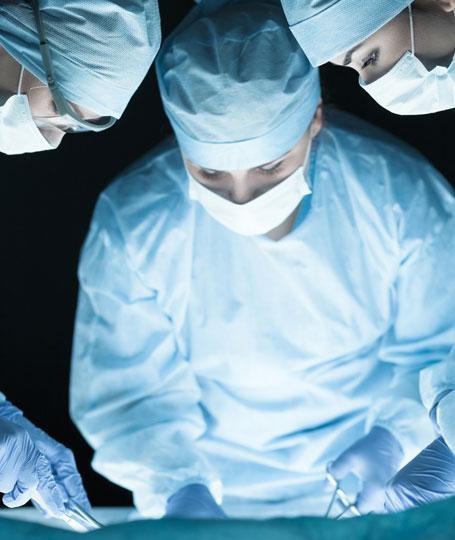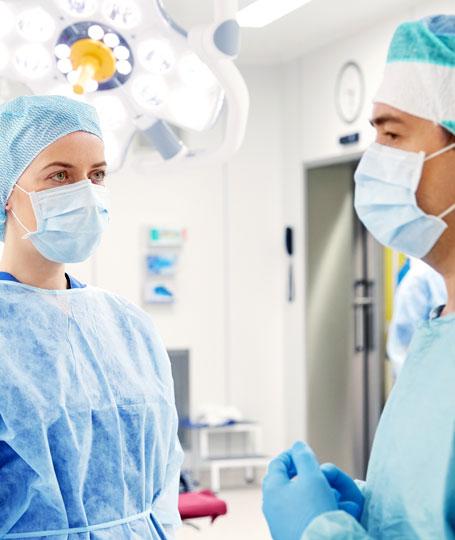
General Surgery Tunisia is the mother discipline of all surgical specialties. It encompasses the principles and techniques of surgery that apply to different parts of the body. It is concerned with the diagnosis and treatment of abnormalities and diseases of many parts of the body.

General Surgery Tunisia Outpatient Surgery Tunisia
The clinic has an outpatient surgery department with 6 beds allowing surgical procedures to be performed in optimal conditions. Our department receives patients for various surgical procedures requiring only a few hours of postoperative stay.
What is ambulatory surgery?
Thanks to advances in surgery and anesthesia, surgical operations can be done in a much simpler way, entering the clinic in the morning and leaving the same day. This is called "outpatient surgery".
Outpatient surgery Tunisia, the Center Clinic
In the Center's clinic, an anesthesiologist and a surgeon will take care of you and your health care team from the moment you arrive until you leave the clinic.
In this ambulatory activity we take care of proctology (anal fissure, anal fistula, hemorrhoids, circumcision, mounted JJ probe, breast adenofibroma, small gynecological procedures, lipomas, cataracts, ophthalmologic and ENT procedures, biopsies under general anesthesia, …).
However, outpatient surgery implies strict operating rules such as the obligation for the patient to be accompanied when returning home.
Your discharge
You will be able to leave the clinic when our doctor deems that you are in good enough condition to return home.
Visceral surgery in Tunisia
Also called digestive surgery, is one of the basic branches of surgery. Formerly called general surgery, it deals with the surgical treatment of benign, malignant, inflammatory and tumoral pathologies of the viscera: the digestive tract (esophagus, stomach, intestine, colon, rectum), the liver, the spleen, the endocrine and exocrine glands (pancreas, thyroid, parathyroid, adrenal) and the lining (hernias...).
The Center's Clinic has the most sophisticated surgical facilities. The 6 operating rooms are equipped with air handling units.
This state-of-the-art technology allows digestive surgeons to perform all kinds of visceral interventions, from the simplest to the most complex.
Our surgeons are all graduates of French or French-speaking training and have professional insurance.


Gastroesophageal reflux: heartburn
Gastroesophageal reflux is the upward movement of part of the stomach contents into the esophagus (the tube connecting the mouth to the stomach).
Pre-operative visit and post-operative follow-up
In the Centre's clinic, a pre-anesthetic visit will be made by a doctor anesthesiologist resuscitator to review your medical and surgical history and see if there is a contraindication to a procedure or if there are special measures that are necessary for the success of your procedure.
The postoperative follow-up will be ensured by a whole team including your surgeon,the anesthesiologist and a qualified paramedical team.
Preparation
- Echocardiogram
- Blood tests
- Digestive Fibroscopy
- Esophageal manometer: to measure the pressure inside the esophagus.
- PH monitoring: a very reliable test to determine if you suffer from gastroesophageal reflux disease(GERD)
- Abdominal ultrasound: The ultrasound examination is done by one of our radiologists to explore the abdominal viscera such as: liver, gallbladder, bile ducts, kidneys, spleen, pancreas and abdominal aorta.
Intervention
It is performed under general anesthesia by laparoscopy. The duration of the operation is approximately one to two hours. A non-return valve by fundal plicature is performed using the NISSEN or TOUPET technique.
Post-operative
- The treatment of postoperative pain is essential in our clinic.
- Prevention of thromboembolic disorders is systematic
- The gastric tube is removed the day after the procedure.
- The length of stay in the clinic is 3 days.
Cholecystectomy Tunisia: removal of the gallbladder
Cholecystectomy Tunisia consists in the removal of the gallbladder. The gallbladder is a small reservoir of bile that drains into the bile duct after a meal.
It can contain stones, can present inflammations and benign or malignant diseases.
In our clinic, a pre anesthetic visit will be made by a resuscitation anesthetist to take your medical and surgical history and to see if there is a contraindication to an intervention or if particular measures will be necessary for the success of your intervention.
The postoperative follow-up will be ensured by a team including your surgeon, the
anesthesiologist and a qualified paramedical team.
Preparation
- Blood tests
- Abdominal Echo
- Thorax Rx
- Echocardiography if needed
Intervention
It will be performed under general anesthesia by laparoscopy. The duration of the operation is approximately one hour. The clinic has a 3D laparoscopy column (1 of the 2 available in Tunisia).
Postoperative
- The treatment of postoperative pain is essential in our clinic.
- The prevention of thromboembolic disorders is systematic.
- The length of stay in the clinic is 2 days.


